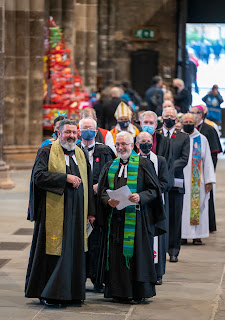I have just finished
reading Doug Gay’s Reforming the Kirk: The Future of the Church of Scotland, (based on the 2017 Chalmers Lectures), a
fascinating, but also extremely challenging, read. Gay is very clearly writing
to and for the Church of Scotland context and there is much that is specific to
that; but there is also a great deal that can easily be applied to my own
United Reformed Church context, either directly or with just a little thought
as to the differences. Indeed, Doug Gay has served as a URC minister and seeks
to apply some of what he learned there to the ‘Kirk’ context.
He is writing into the
situation of decline which challenges the vast majority of mainline traditional
denominational Christianity in the UK in these days. As he says of the Church
of Scotland context, but it applies much more widely: “From the 1960s, membership began to decline, numbers of church
weddings declined, numbers of infant baptisms declined and attendances at
worship declined. That such decline has been a painful and dispiriting
experience for hundreds of thousands of Scots is beyond question. Some of the
ministers retiring now or who retired in the past decade, especially those who
were ordained in the 1970s, have spent their whole ministries with declining
congregations.”
He is concerned to suggest
possible solutions for a refreshing of the Kirk. As he says: “Increasingly,
institutional survival will come only through missional renewal. The tide is
going out too fast for it to be otherwise. Sessions which had functioned
reasonably well as administrative or pastoral bodies are experiencing new and
unsettling challenges as urgent questions about missional leadership are put to
them.”
I am fascinated by some of
what he says about eldership, ministry and church organisation – but exploring
that would take too much space here. What can certainly be agreed is that there
is a crisis. He talks of the Kirk seeing the threat of congregationalism but, I
think, suggests we need to reduce the amount of centralisation. He says: “Without compromising on generosity and solidarity,
we need to reinvigorate local motivations to be sustainable and adventurous.
Our current highly centralised systems are strong on pooling and sharing, but
they look increasingly less well suited to motivating local giving. The acute
missional challenges facing the Kirk over the period to 2030 call for a new
financial imagination which will maintain a powerful commitment to smart,
creative and empowering expressions of national sharing while incentivising a
new era of local responsibility and offering greater local and regional
flexibility.“ That same debate is
very live in the URC, as we, too, struggle with the balance between emphasising
the local, the regional (presbytery/Synod) and the denomination, despite those
points where he cites us as being a good example. Though many colleagues would
disagree with me, I, too, wonder if we have become, and continue to become, too
centralised.
Incidentally, I really
like his idea of commissioned elders, not replacing, but going alongside the
traditional ordained for life model. He suggests: “The Kirk would introduce a new form of eldership alongside the old.
Commissioned elders, as I suggest we call them, would be set aside to serve for
periods of three years, with that three-year commission capable of being
extended indefinitely, subject to concurrence on both sides. The decision to be
commissioned or ordained would lie with the prospective elder and they would be
asked to make it on the basis of discerning whether they understood their
calling to the office in terms of a lifelong consecration or a time-limited
assignment. No judgement would be made about depth of faith or degree of
commitment, the discernment of vocation would be related to what Moltmann
describes as the ‘charismatic freedom’ of the church, recognising that after
one or more terms of commissioned eldership, a woman or man might feel called
to a different sphere of service. Both forms of eldership would be eligible to
fulfil exactly the same functions within the courts and councils of the Church
of Scotland. The advantage of this reform would be that without diminishing,
altering or undercutting the status of those already ordained to eldership, or
preventing others being ordained in the future, new avenues of ministry could
be opened up to church members who have the gifting and calling to serve, but
have not felt called to be ‘ordained’ to this office for life.”
Could we possibly pull
that off?










